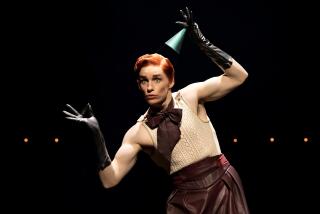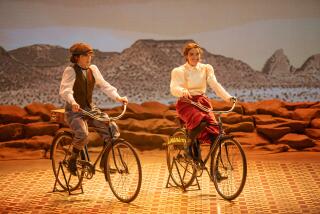‘Finding Neverland’ ready to fly after a bumpy trip to Broadway
A week from opening night, what might charitably be called a charge of creative tension ripples through a rehearsal for the new Broadway musical “Finding Neverland.”
The show’s choreographer is jumping on the stage of the Lunt-Fontanne theater to switch up the pacing of a fantasy sequence. Kelsey Grammer is standing stage right, working on a joke about cucumber sandwiches.
His costar, “Glee’s” Matthew Morrison, is mentally running through a number that has been overhauled so many times the musical veteran has taped a crib sheet on a strategic spot inside the orchestra pit so he can keep the lyrics straight.
“Can you get your crocodile tail on?” a voice projects from the middle of the theater. It belongs to Diane Paulus, the Tony-winning director on whose back this long-scrutinized, much-fiddled-with show is riding. “Wear it lower, so it’s not at your waist,” she added, continuing to address a cast member from the whimsy-filled ensemble scene. “Then you can get to the lamp post in time.”
As “Finding Neverland” prepares to open Wednesday after a gestation period of nearly five years and a budget of at least $20 million, the theater world finds itself with an unusually big bet. Adapted from the 2004 London-set film about playwright J.M. Barrie (played by Johnny Depp), a widow and her lost-boy sons, “Finding Neverland” marks Harvey Weinstein’s debut as a Broadway creative producer — and implictly asks whether the brassy film executive, who has turned his share of magic tricks in Hollywood, can repeat those feats on Broadway.
That, however, is only one of many points of intrigue for the show. The story about the struggles of author Barrie (Morrison) to create the play “Peter Pan” in the early 1900s has faced nearly as many challenges as its lead character.
“Finding Neverland” is based on a well-liked but hardly iconic movie, conjures up Peter Pan but contains few scenes of the flying hero, brings together some especially disparate creative personalities and seeks to maintain the film’s whiff of tragedy while laying on plenty of pop songs. The show’s music was composed by Gary Barlow and Eliot Kennedy —the Brits behind the long-running chart-topping boy-band Take That (probably best known in the U.S. for their 1995 singalong, “Back for Good.”)
Says Weinstein, directly, “This is the hardest thing I’ve ever done.”
The screen-to-stage trend has gone into overdrive in recent years, particularly in musicals, reaching far beyond Disney Theatricals shows (“The Lion King,” “Aladdin”) to such less obvious source material as “Rocky,” “Once,” “Big Fish” and the upcoming “Waitress.”
That craze has sent many an enterprising producer to his library and prompted the opportunity-minded Weinstein to embrace “Neverland” as a stage piece. After all, the film embodied Weinstein productions of that era, which also included “Shakespeare in Love” and “Chocolat” — light comedies in foreign settings that proved surprisingly popular. “Finding Neverland” seemed just the right genteel fit for modern Broadway.
Matters hardly proved that simple.
A U.K. tryout with the Tony winning director and choreographer Rob Ashford was panned by critics in 2012–the problem was too much emulation of the film, Weinstein believes--forcing a ground-up reconstruction when the project reached U.S. shores with Paulus, at her American Repertory Theater in Cambridge, Mass.
The production’s arrival in New York wasn’t the end of the road, either. In recent weeks, “Neverland” has undergone the kind of eleventh-hour adjustments that are large even by the standards of new musicals.
“It’s been a challenge,” Grammer says before a recent preview performance. “ ‘Rigorous,’ I think, would be the word.”
On the rehearsal day, the company is working out the kinks of “All of London Is Here Tonight.” The number was written just a few days before, nearly halfway through previews, but is now the anchor of the show’s troubled and oft-changed opening.
The addition of “All of London” illustrates the challenge of adapting films for the stage. Many movies, especially period dramas, start off slowly, with much necessary exposition. But musicals require a big number to set the tone.
“You can’t just try to re-create what happened on film,” Paulus says. “It won’t work. The opening just felt too stuffy,” she added of the earlier attempts. “It didn’t feel right.”
Paulus in recent years has directed well-regarded stagings of “Hair” and “Pippin,” among others--revivals that tend not to face the same obstacles as new musicals. She says that she doesn’t believe all the down-to-the-wire work would translate into post-opening wrinkles.
“Andrew Lloyd Webber was backstage the other night, and he told a story about how ‘Oklahoma!’ had a different name right before it opened,” she says. “You take comfort in all the war stories of opening numbers and other changes that went into hit new musicals at the last minute.”
Much of the success of “Never” will depend on the music. Rather than have Barlow and Kennedy write songs off the script — a typical approach — Paulus and Weinstein sent them off to compose music independently. That may explain why many of the numbers — which include the female solo “All that Matters” and the male duet “When Your Feet Don’t Touch the Ground” — sound as much like radio-friendly pop numbers as musical standards.
“I needed to be honest; I’m not someone who writes musicals. I’d never done it before,” Barlow says. “So I just said, ‘Let me have the experience of sitting down at a piano and seeing what moves me.’ ” That process went on for a year, at which point Barlow and Kennedy delivered 19 songs to Paulus--which were then worked and reworked to fit into the musical.
One number in particular, the Elton John-esque “Something About This Night,” has had a bumpy road. The song, under various titles, at first came early in the show. It was then pushed further and further into the production, so much so that “I wouldn’t be surprised if it was pushed out entirely and didn’t even make the final show,” Barlow said. (It did, three songs from the end.)
For all of “Neverland’s” pop gloss, it also contains a melancholy vibe, as Sylvia (played by the theater go-to Laura Kelly, one of the few British-born actors in the show) suffers a series of tragedies. “There’s a lot of uplift but also something sad and emotional, which I think makes this unique,” Kelly said.
There is, of course, some fun too. A number that closes the first act offers the chance to recreate elements from Peter Pan, as Barrie dreams of Captain Hook battling him on the stormy seas. Grammer stars both as Hook and as the put-upon American producer who has to see Barrie’s unconventional Peter Pan through, allowing for the actor’s brand of Noel Coward-esque comedy. There is even a “Cheers” joke.
And though the film offers makes many attempts to keep the mood light, there are perhaps bolder opportunities here. “Johnny Depp put a spoon on his nose, and that was like ‘oh, that’s cool.’ But we can do something much bigger,” Morrison said, alluding to a fantasy sequence involving Barrie and Sylvia’s children that’s been more elaborately re-created for the stage.
It’s easy to find in “Neverland” parallels to Weinstein’s film career, at least in terms of process — a seeking out of top talent, tweaking aplenty, a fair share of pre-opening drama and even a version of what Weinstein describes as screen testing (via Broadway audience surveys).
Can it work? Box office during previews has been strong, and at a recent performance, the crowd’s response was enthusiastic. There may be another echo in all this of Weinstein’s film oeuvre, which over the years has seen a correlation between pre-opening tension and post-release success.
“He’s not what we used to call in TV an early settler,” Grammer says. “He won’t go for the joke or line just because it works right away.”
Paulus says that Weinstein has been vocal about changes but ultimately realized he had more to gain by listening, even reading books on theater she recommended and allowing her to win many of the creative battles.
Weinstein admits the challenge has been to relinquish control in areas he’s unfamiliar with.
“The temptation is to replicate the movie on the stage,” he says. “But there are a lot of mistakes that can come that way. As I found out, because I was the author of those mistakes.” He says he didn’t have a burning desire to mount another Broadway production “I just had to get this out of my system.”
Just the same, he’s contemplating some other stage experiments, including a theatrical version of “Around the World in 80 Days,” the Jules Verne novel that has yielded several movies. Weinstein is plotting it as a musical, and he has already begun recruiting both Paulus and Barlow to come along for the ride.
More to Read
The biggest entertainment stories
Get our big stories about Hollywood, film, television, music, arts, culture and more right in your inbox as soon as they publish.
You may occasionally receive promotional content from the Los Angeles Times.







